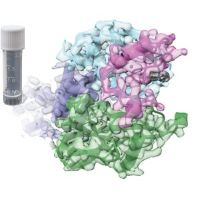Specification
| Description | Recombinant protein from the full-length sequence of homo sapiens SLAM family member 7 (SLAMF7), transcript variant 1 (NM_021181). |
| Organism | Homo sapiens (Human) |
| Expression Host | Human Cells |
| Tag Info | His or DYKDDDDK. Please contact us if you need further information or require specific designed tag. |
| Purity | Greater than 90% by SDS-PAGE gel |
| Uniprot ID | Q9NQ25 |
| Entry Name | SLAF7_HUMAN |
| Gene Names | SLAMF7 CS1 UNQ576/PRO1138 |
| Alternative Gene Names | CS1 |
| Alternative Protein Names | SLAM family member 7 (CD2 subset 1) (CD2-like receptor-activating cytotoxic cells) (CRACC) (Membrane protein FOAP-12) (Novel Ly9) (Protein 19A) (CD antigen CD319) |
| Application | Antigens, Western, ELISA and other in vitro binding or in vivo functional assays, and protein-protein interaction studies; For research & development use only! |
| Buffer | Purified protein formulated in a sterile solution of PBS buffer, pH7.2, without any preservatives |
| Endotoxin | Endotoxin level is < 0.1 ng/µg of protein (<1EU /µg) |
| Length | 335 |
| Molecular Weight(Da) | 37421 |
| Protein Sequence | (The sequence of expressed protein may have some variation from the sequence shown below. Please contact us for the exact sequence.) MAGSPTCLTLIYILWQLTGSAASGPVKELVGSVGGAVTFPLKSKVKQVDSIVWTFNTTPLVTIQPEGGTIIVTQNRNRERVDFPDGGYSLKLSKLKKNDSGIYYVGIYSSSLQQPSTQEYVLHVYEHLSKPKVTMGLQSNKNGTCVTNLTCCMEHGEEDVIYTWKALGQAANESHNGSILPISWRWGESDMTFICVARNPVSRNFSSPILARKLCEGAADDPDSSMVLLCLLLVPLLLSLFVLGLFLWFLKRERQEEYIEEKKRVDICRETPNICPHSGENTEYDTIPHTNRTILKEDPANTVYSTVEIPKKMENPHSLLTMPDTPRLFAYENVI |
Background
| Function | FUNCTION: Self-ligand receptor of the signaling lymphocytic activation molecule (SLAM) family. SLAM receptors triggered by homo- or heterotypic cell-cell interactions are modulating the activation and differentiation of a wide variety of immune cells and thus are involved in the regulation and interconnection of both innate and adaptive immune response. Activities are controlled by presence or absence of small cytoplasmic adapter proteins, SH2D1A/SAP and/or SH2D1B/EAT-2. Isoform 1 mediates NK cell activation through a SH2D1A-independent extracellular signal-regulated ERK-mediated pathway (PubMed:11698418). Positively regulates NK cell functions by a mechanism dependent on phosphorylated SH2D1B. Downstream signaling implicates PLCG1, PLCG2 and PI3K (PubMed:16339536). In addition to heterotypic NK cells-target cells interactions also homotypic interactions between NK cells may contribute to activation. However, in the absence of SH2D1B, inhibits NK cell function. Acts also inhibitory in T-cells (By similarity). May play a role in lymphocyte adhesion (PubMed:11802771). In LPS-activated monocytes negatively regulates production of proinflammatory cytokines (PubMed:23695528). {ECO:0000250|UniProtKB:Q8BHK6, ECO:0000269|PubMed:11698418, ECO:0000269|PubMed:11802771, ECO:0000269|PubMed:16339536, ECO:0000269|PubMed:23695528, ECO:0000269|Ref.4}.; FUNCTION: Isoform 3 does not mediate any NK cell activation. |
| Pathway | |
| Protein Families | |
| Tissue Specificity | Expressed in spleen, lymph node, peripheral blood leukocytes, bone marrow, small intestine, stomach, appendix, lung and trachea. Expression was detected in NK cells, activated B-cells, NK-cell line but not in promyelocytic, B-, or T-cell lines. Expressed in monocytes. Isoform 3 is expressed at much lower level than isoform 1. {ECO:0000269|PubMed:11220635, ECO:0000269|PubMed:11698418, ECO:0000269|PubMed:11802771, ECO:0000269|PubMed:12242590, ECO:0000269|PubMed:23695528}. |
QC Data
| Note | Please contact us for QC Data |
| Product Image (Reference Only) |  |

